
Plettenberg Bay, nicknamed Plett, is the primary town of the Bitou Local Municipality in the Western Cape Province of South Africa. According to the census of 2001, the town had a population of 29,149. It was originally named Bahia Formosa by early Portuguese explorers and lies on South Africa's Garden Route 210 km from Port Elizabeth and about 600 km from Cape Town.

Knysna is a town with 76,150 inhabitants in the Western Cape province of South Africa. It is one of the destinations on the loosely defined Garden Route tourist route. It is situated 60 kilometres east of the city of George on the N2 highway, and 33 kilometres west of the Plettenberg Bay on the same road.
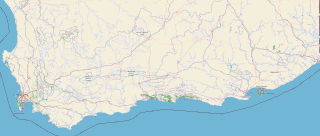
The Garden Route is a 300-kilometre (190 mi) stretch of the south-eastern coast of South Africa which extends from Witsand in the Western Cape to the border of Tsitsikamma Storms River in the Eastern Cape. The name comes from the verdant and ecologically diverse vegetation encountered here and the numerous estuaries and lakes dotted along the coast. It includes towns such as Witsand, Heidelberg, Riversdale, Stilbaai, Albertinia, Gouritsmond, Knysna, Plettenberg Bay, Mossel Bay, Oudtshoorn, Great Brak River, Little Brak River, Wilderness, Sedgefield and Nature's Valley; with George, the Garden Route's largest city and main administrative centre.

The Cape Floral Region is a floristic region located near the southern tip of South Africa. It is the only floristic region of the Cape Floristic Kingdom, and includes only one floristic province, known as the Cape Floristic Province.
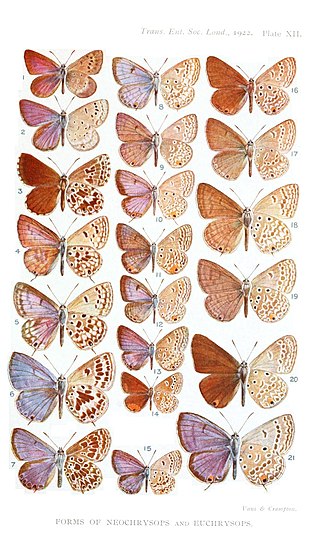
Orachrysops niobe, the Brenton blue, is a species of butterfly in the family Lycaenidae and is endemic to South Africa.
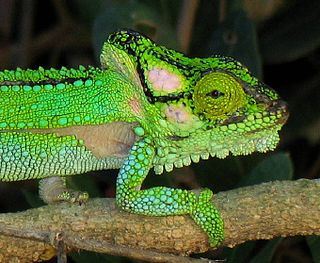
The Knysna dwarf chameleon is a species of dwarf chameleon in the Bradypodion genus that is endemic to South Africa. It is a forest dweller, found only in a limited range in the afromontane forests near Knysna, South Africa, and in certain surrounding areas.
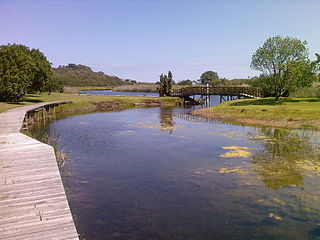
Wilderness National Park, also called the Wilderness Section, is located around the seaside town of Wilderness between the larger towns of George and Knysna, in the Western Cape. It is a protected area of South Africa forming part of the Garden Route National Park.

Rondebosch Common is an open common of about 40 hectares in Rondebosch, Cape Town in South Africa. A common is defined as "a piece of open land for public use, esp. in a village or town". It contains one of the few surviving pockets of the critically endangered “Cape Flats Sand Fynbos” vegetation type, which exists nowhere else in the world.
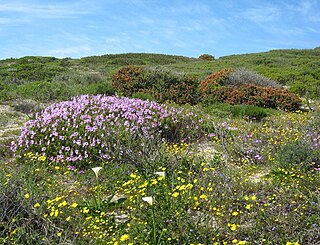
Cape Flats Dune Strandveld is an endangered vegetation type. This is a unique type of Cape Strandveld that is endemic to the coastal areas around Cape Town, including the Cape Flats.

Cape Flats Sand Fynbos (CFSF), previously known as Sand Plain Fynbos, is a critically endangered vegetation type that occurs only within the city of Cape Town. Less than 1% of this unique lowland fynbos vegetation is conserved.
Mamre Nature Garden is a 254-hectare (630-acre) nature reserve in Cape Town, South Africa, located on the city's northern outskirts. The reserve has a high degree of biodiversity and preserving the endangered Atlantis Sand Fynbos vegetation type and the plants and animals that live in it. In addition, the reserve has an important cultural history.

Kenilworth Racecourse Conservation Area is a 52-hectare (130-acre) nature reserve, situated in the centre of Kenilworth Racecourse, in Cape Town, South Africa. Due to its location, it has been left undisturbed for more than 100 years, making it now the best preserved patch of “Cape Flats Sand Fynbos” in the world.

De Hel Nature Area is a 21.3-hectare (53-acre) nature reserve protecting a river valley and indigenous forest on the lower eastern slopes of Table Mountain, Cape Town, South Africa.
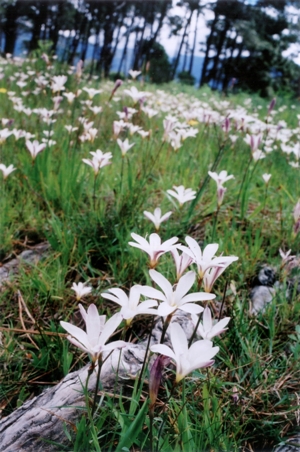
Meadowridge Common is an 8-hectare (20-acre) reserve in the Meadowridge suburb of Cape Town, South Africa, which preserves a fragment of critically endangered Cape Flats Sand Fynbos vegetation.
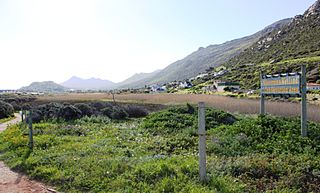
Lower Silvermine Wetlands is a nature reserve on the Cape Peninsula, in Cape Town, South Africa.
Witzands Aquifer Nature Reserve is a 3,000-hectare (7,400-acre) protected natural area in Cape Town, South Africa, located on the city's northern outskirts. This reserve protects an important part of Cape Town's natural and cultural heritage, including the Atlantis Aquifer. It is adjacent to the Koeberg Nature Reserve.

Durbanville Nature Reserve is a 6-hectare (15-acre) piece of protected land, located next to the Hollywoodbets Durbanville Racecourse in the Western Cape, South Africa.

Blaauwberg Nature Reserve was proclaimed a local and provincial nature reserve in 2007. The reserve has views down fynbos slopes, across the city, to seven kilometres of rocky and sandy coastline and the ocean and beyond. The reserve presents itself as one of the few viewpoints in the world from where you can see two proclaimed world heritage sites, namely Table Mountain and Robben Island.

Kogelberg Nature Reserve is a nature reserve of 3,000 ha comprising the Kogelberg Mountain Range, to the east of Cape Town, South Africa.

Featherbed Nature Reserve is a privately owned nature reserve on the Western Headland of the Knysna River Estuary on South Africa’s Garden Route.





















